This month I have shared with you my 15 Kids Games I Can’t Live Without for Therapy and 10 Therapy Materials I Can’t Live Without. Today I am going to share 9 reference books I can’t live without! Here they are (in no particular order):
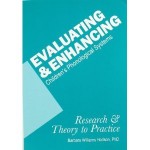 #1 Evaluating & Enhancing Children’s Phonological Systems by Barbara Hodson. This book seriously is amazing. I feel like I didn’t really learn much in my Phonology class in grad school (reading pages and PAGES of research? Yeah not so much….) that was really helped me TREAT phonological disorders so this book really helped me understand what on earth I was supposed to be doing! Barbara Hodson is also the author of the HAPP-3, the Hodson Assessment of Phonological Processes Third Addition, which is the assessment I own and prefer to use to assess the phonological systems in young children. Even if you do not use the Cycles approach, I still feel this is an important book for any clinician working with little ones.
#1 Evaluating & Enhancing Children’s Phonological Systems by Barbara Hodson. This book seriously is amazing. I feel like I didn’t really learn much in my Phonology class in grad school (reading pages and PAGES of research? Yeah not so much….) that was really helped me TREAT phonological disorders so this book really helped me understand what on earth I was supposed to be doing! Barbara Hodson is also the author of the HAPP-3, the Hodson Assessment of Phonological Processes Third Addition, which is the assessment I own and prefer to use to assess the phonological systems in young children. Even if you do not use the Cycles approach, I still feel this is an important book for any clinician working with little ones.
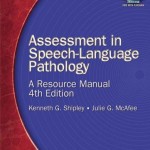 #2 Assessment in Speech-Language Pathology: A Resource Manual
#2 Assessment in Speech-Language Pathology: A Resource Manual by Kenneth Shipley and Julie McAfee. I actually have the second edition, and I have to say that this is one of few “text” books that I got in grad school that I have gotten a ton of use our of past graduation. In fact, mine is starting to fall apart so I may need to upgrade soon!! I would say this is the number ONE book I have used since I got it and it was WELL worth the money. Here is the book description from Amazon:
This valuable reference is a cornerstone resource for clinicians working with the gamut of communication disorders. This new edition has a completely updated design, with the addition of a second color to highlight key content. The book has been updated to include two new chapters on foundation of assessment and multicultural issues in assessment to make this the most comprehensive resource manual on assessment in speech-language pathology. It continues to offer users a wide range of procedures and materials for obtaining and interpreting assessment data, and reporting assessment findings to clients, caregivers, and other professionals – all of which are directly applicable to clinical work and are useful instructional tools for students. To help the clinician and student access more specific disorder and assessment information, each chapter concludes with a section called Sources of Additional Information containing references and websites. This new edition comes with a free CD-ROM containing additional resources and the forms from the text in several formats for users to download, print and photocopy, and modify for individual clinical use.
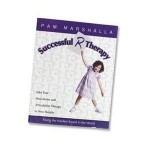 #3 Successful R Therapy by Pam Marshalla. This is an entire BOOK on the /r/ sound. Only the /r/. A WHOLE book on it. I suggest buying it when you have time to actually read it because there is a TON of info in there! I promise you won’t be disappointed but you might be like me and have to read parts over and over again! Here is the book description from Pam Marshalla’s Website:
#3 Successful R Therapy by Pam Marshalla. This is an entire BOOK on the /r/ sound. Only the /r/. A WHOLE book on it. I suggest buying it when you have time to actually read it because there is a TON of info in there! I promise you won’t be disappointed but you might be like me and have to read parts over and over again! Here is the book description from Pam Marshalla’s Website:
This book teaches how the jaw, lips, and tongue work for correct R production. Learn to understand the difference between the Consonantal R and the Vocalic R, and between a Tip R and a Back R. Successful R Therapy teaches you how to train even the most difficult R clients. You’ll learn how to establish a “Cornerstone R” (the first R sound your student can produce consistently) and then move quickly to words, sentences, and conversational speech.
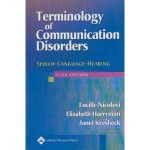 #4 Terminology of Communication Disorders: Speech-Language-Hearing
#4 Terminology of Communication Disorders: Speech-Language-Hearingby Lucille Nicolosi, Elizabeth Harryman, and Janet Kresheck. This was required in one of my classes in college and I have found that I actually use it time to time but I used it quit a bit my first few years out of school. It is like a dictionary of all terms that relate to Communication Disorders. Great quick reference!
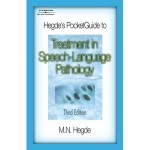 #5 &Â #6 Hegde’s PocketGuide to Treatment in Speech-Language Pathology
#5 &Â #6 Hegde’s PocketGuide to Treatment in Speech-Language Pathology and Hegde’s PocketGuide to Assessment in Speech-Language Pathology
by M.N. Hegde. I bought these YEARS ago (the first ones!) because I met Dr. Hegde while in grad school and knew he would write a good book. These are super handy quick reference guides for all things speech-language pathology. From stuttering to strokes you will find a little something here and there of value.
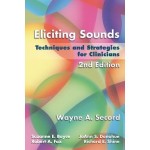 #7 Eliciting Sounds: Techniques and Strategies for Clinicians
#7 Eliciting Sounds: Techniques and Strategies for Clinicians by Wayne A. Secord, Suzanne E. Boyce, JoAnn S. Donohue, Robert A. Fox, Richard E. Shine. So I must admit that I don’t have this edition. When I was in grad school doing my school internship my supervisor Joy had a copy of the ORIGINAL book…so I did what any BROKE grad student does and I copied the ENTIRE book. I know, I know…terrible. But the book was amazing and I was, well, broke. This edition has been on my “list” of things to buy for a while so I hope to pick it up soon.
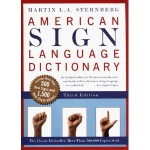 # 8 American Sign Language Dictionary, Third Edition
# 8 American Sign Language Dictionary, Third Edition by Martin L.A. Sternberg. This was required in my sign language classes in grad school but anyone working with special needs kiddos should have a GOOD American Sign Language Dictionary handy and I LOVE this one!!
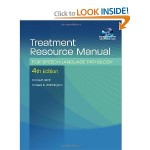 #9 Treatment Resource Manual for Speech Language Pathology
#9 Treatment Resource Manual for Speech Language Pathology by Froma P. Roth and Colleen K. Worthington. I think I have the second edition of this? Though I do not use it a ton these days, this was another that I found useful my first few years out of school. I am glad one of my professors made this a required textbook!
What are YOUR go-to reference books?
Language Disorders from Infancy through Adoloscence: Assesment and Intervention. 3rd Edition by Rhea Paul. It looks intimidating but it has a TON of great resources and charts for language development
I went and bought the book “Evaluating & Enhancing Children’s Phonological Systems” based off your recommendation….I LOVE IT!!!
I wish I would have had this book years ago…actually I wish we could have read this book rather than take the grad phonology class…I learned SO much more from the book…and information that I can actually use!!!
Any good Receptive language books?
Chantelle, I am SO GLAD you loved it!!! I totally agree…this should have been a required book in grad school rather than the mounds of research papers I had to read. Sigh.
HHmmmmm receptive language books…I;ll be honest I can’t think of any amazing ones off the top of my head…I’ll think about it and get back to you….
I refer to Teri Bellis’ book, “When the Brain Can’t Hear” for explanations and ideas re: auditory processing. Also, Tony Atwood’s book, “Asperger’s Syndrome: A Guide for Parent and Professionals,” is very useful and helpful.
Wonderful website. I’m glad I “stumbled” upon it!
Great post. Just stumbled upon it! I am a 2nd year speech assistant (working on getting into grad school) working in the public schools. I had added “Successful R Therapy” and “Eliciting Sounds” onto my wishlist awhile back, but was wondering if I should actually buy them! Glad they were on your list! I am definitely going to look into buying a lot of these! Thanks for the post! 🙂
if u have a soft copy of terminoly of communication disorders can u plz send me?
Hi Jeena…I’m sorry I am not sure what you mean?
if u have a ebook of terminoly of communication disorders ?
jeena recently posted..How to Help Your Child Talk: Listen With Your Eyes
I agree with some of the books you said.
Must haves:
Treatment Resource Manual
Assessment in Speech-Language Pathology – includes wonderful forms such as parent interviews for case history that I use with every pediatric evaluation
and every SLP needs a sign language dictionary or website. I use babysignlanguage’s website as a quick reference for parents.
Hi Katie,
I`ve been an English teacher in Japan for a decade and worries much about the speech or pronunciation problem of the Japanese and thought I want to attend grad school of speech pathology but time and money won`t allow me this time. But then again, I want to start reaching and helping these people who have difficulties on making the correct English sounds, but I don`t know where to start.. I hope you can give me a lot of advise. thank you in advance and more power to you.
Best regards,
Aleta